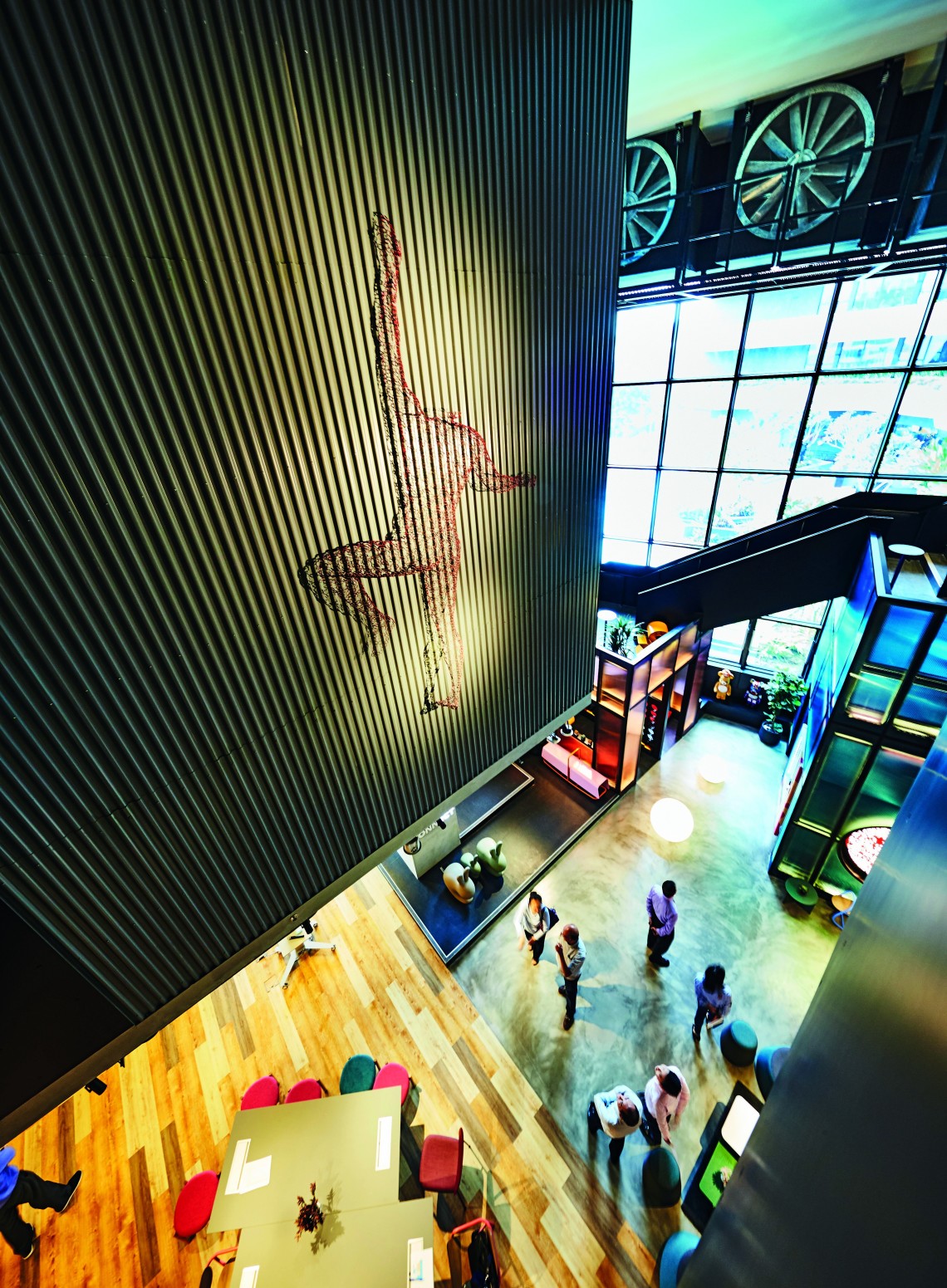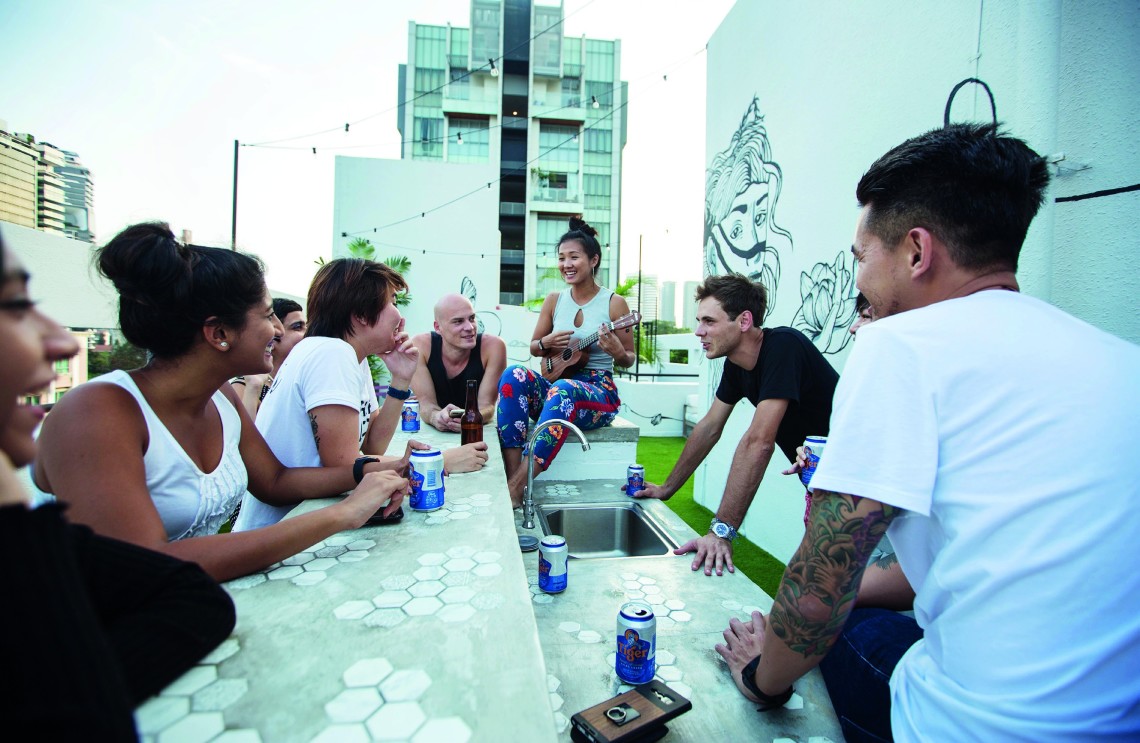Communal areas designed for interaction and exclusive networking sessions are the reasons why co-living is now a viable option for singaporean millennials who want to mingle.


"Every room at Lyf comes with custommade furniture."
When Pree Domadaran saw the simple-yet-clean colours and textures, and the minimalist interior, she was sold.
It was exactly what the 35-year-old was looking for when she was roomhunting seven months ago. Pree, a public speaking coach, tells Her World: “I was looking at HDB flats and condominiums. While I could afford many of the spaces, they required long-term contracts, and the rooms were poorly furnished.”
The Singaporean now lives – and works – in the trendy district in the East Coast at Hmlet@Lorong G, a property that was transformed from a school building into a co-living space this year.
“I value my privacy. I was staying with my parents and grandma before that, and it can be quite distracting,” adds Pree, who pays $1,300 a month for rental for her room at Hmlet@Lorong G.
“I’m a co-living convert,” she professes. “The spaces are stylish and beautifully furnished, and the common areas are great to work at because you’re not cooped up in a room. You also get to constantly interact with your neighbours.”
GROWING A LOCAL TRIBE
Pree is among the growing local community who have opted to live in the predominantly expat coliving developments. Real estate firm JLL Singapore’s co-living survey shows that for every two foreigners who are willing to move to a co-living space, one Singaporean is keen to do so.
Newer iterations are now more millennialfocused, and the hipsteramenitised rental developments are gobbling up square footage in Singapore.
While social gatherings are common among residents (known as “citizens” or “tribe”), coliving spaces now feature a multifaceted programme – from art-jamming to TED talks and kick-boxing classes – on top of amenities like shared laundromats, Masterchef-styled kitchens, co-working zones, and even an open-concept cinema.
Today, there are more than 20 co-living properties – managed by Hmlet, Coliwoo and Login – in Singapore’s housing scene since the concept was introduced last year.
The newest kid on the block is Lyf Funan with 412 rooms across 279 apartments, making it the largest co-living property in South-east Asia. Co-living companies are disrupting traditional apartment life, as much as co-working spaces did for staid office life, drawing upon the concept of resource-sharing.
Property observers say the trend is also buoyed by a yearning for connection – social and professional – among expatriates, and a local millennial work force that’s increasingly freelance.
“Co-living has picked up as a living concept in Singapore, because the younger community appreciate the opportunities for increased interaction that come with community living,” says Ong Teck Hui, senior director of real estate research and consultancy of JLL Singapore.
“We see an increased interest in younger Singaporeans who are switching from conventional rented premises to these co-living spaces when they move out from their parents’ house.”
COMPETITIVE RATES
Despite shared amenities among residents, room rentals are competitive to market rates. It costs averagely between $1,000 and $2,800 a month to rent a bedroom of at least 180 sq ft, which is comparable to renting a bedroom in a condo apartment.
Tenants can decide how long they want to stay – even if it’s for a month or less. They don’t need to make trips to the furniture shop, as the rooms are fully furnished with many locations to choose from. Properties under Login, for example, rental comes with free Internet, weekly housekeeping – and it covers the utility bills.
At the higher end of the spectrum, Lyf Funan requires a membership of at least $1,000 a month, offering from studio apartments (for two persons) to four-bedroom apartments (for six people).
The rooms, which are accessible by mobile keys, feature Instagram-worthy, gender-neutral interiors with light wood furnishings juxtaposed against pastel-coloured panels and decor.
Managed by servicedresidence operator The Ascott, the nine-storey coliving space is heaving with activities from hackathons, music jamming sessions, networking sessions, cooking classes to craft workshops, and movie nights at its residents-only open-concept cinema.
Angela Lau, marketing manager of The Ascott says: “We have shared spaces like Bond, which is our social kitchen, and Connect, a large communal area.”
NO FRAT HOUSE
While some have likened co-living spaces to a hipster-like adult dorm, they are no (rowdy) frat houses. A huge focus is placed on community bonding. And it’s no surprise to see many co-living spaces run by millennials.
Lyf Funan, for example, is managed by what they call Lyf Guards – millennials who are the community managers, city and food guides and event organisers.
A Login spokesman says: “We speak to all our potential tenants to learn their preferences and their usual routine. We then try to match our tenants and make the best room/apartment recommendations based on these factors.”
And, money can’t rent you a space – if you don’t fit in. One has to come for an interview or submit a video of themselves – if you want to live at Lyf Funan.
Angela of The Ascott that manages Lyf explains: “We want our residents to live harmoniously, and we try to weed out any cases of having mismatched floor-mates through these interview sessions.”


SHARED FACILITIES AT CO-LIVING SPACES
Hmlet’s latest property at Cantonment has an outdoor plunge pool for residents.
Lyf’s social gym is an abstract set up with a human-sized hamster wheel that functions as a manual treadmill.
All rooms are strategically placed to increase the chances of small talk at Lyf and Hmlet.
Rest, work or throw a party at the multi-purpose common rooms at Login.
Social games are installed at Lyf’s laundromat to minimise awkward waiting time.

"What you can find at the Connect, Lyf Funan’s multi-purpose common space: a ball pit, photobooth and coworking space."
UPS & DOWNS




THE LATEST COLIVING SPACES
1 LYF AT FUNAN
Monthly: Buy a membership at $1,000++ or book a room for $144+ per night (one month minimum stay).
2 LOGIN
Monthly: From $1,500 for a single room.
3 COLIWOO
Monthly: From $1,200 for a single suite. Units are also for sale.
4 HMLET
























